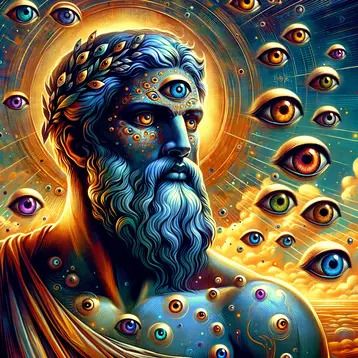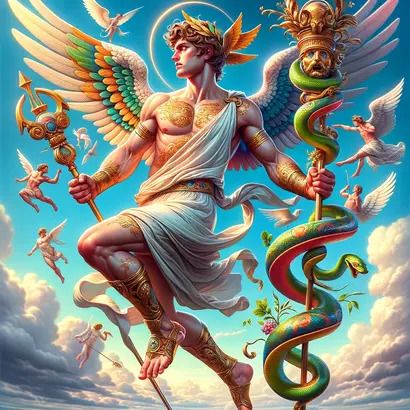
Argus Panoptes
Argus Panoptes :: The Hundred-Eyed Giant
Argus Panoptes, also known as Argos, was a formidable figure in Greek mythology, renowned for his hundred eyes. As the son of Arestor, Argus was a giant whose name "Panoptes" aptly means "the all-seeing one," a testament to his unparalleled vigilance and perception.
Role as Hera's Servant
Argus served Hera, the queen of the gods, and carried out several tasks on her behalf. Among his notable feats was the slaying of the monster Echidna, the wife of Typhon. This accomplishment cemented his reputation as a powerful and fearless guardian.
Guardian of Io
Argus's most famous task, however, was the guardianship of Io, a nymph who had drawn the attention and affection of Zeus. Hera, suspecting Zeus's intentions and wanting to thwart any liaison, appointed Argus to watch over Io. With his hundred eyes, Argus was an ideal guardian, able to keep watch over Io constantly, allowing not even a moment for Zeus to approach her unnoticed.
The Role of Hermes and the Death of Argus
To rescue Io, Zeus enlisted the help of Hermes, the messenger of the gods. Hermes, disguised as a shepherd, was tasked with lulling Argus to sleep. Utilizing his cunning and musical skills, Hermes eventually succeeded in putting all of Argus's hundred eyes to sleep. Once Argus was asleep, Hermes killed him with a stone, freeing Io from her captivity.
Aftermath and Legacy
After the death of Argus, Hera, in mourning for her faithful servant, placed his eyes on the tail of the peacock, her sacred animal. This act immortalized Argus's vigilance, making the peacock a symbol of watchfulness and protection. The story of Argus Panoptes highlights themes of loyalty, vigilance, and the complex interplay of power among gods and mythological creatures in Greek mythology.
Argus Panoptes Q&A
Link/Cite Argus Panoptes Page
Written by: The Editors of GreekMythology.com. GreekMythology.com editors write, review and revise subject areas in which they have extensive knowledge based on their working experience or advanced studies.
For MLA style citation use: GreekMythology.com, The Editors of Website. "Argus Panoptes". GreekMythology.com Website, 30 Nov. 2023, https://www.greekmythology.com/Myths/Creatures/Argus_Panoptes/argus_panoptes.html. Accessed 27 April 2024.





